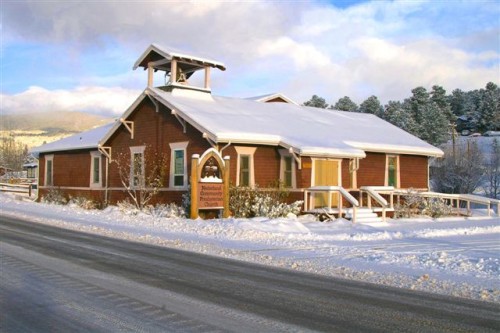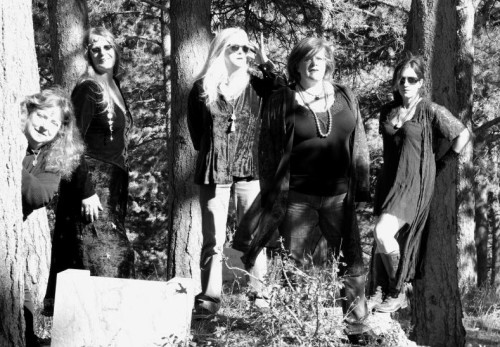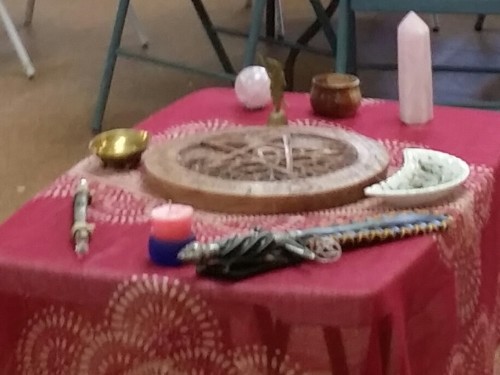NEDERLAND, Col. – Nestled in the Rocky Mountains and resting at an elevation of 8,230 feet lies the small town of Nederland, Colorado. It was founded in 1874 by settlers who were attracted to the lowland valleys as a outpost for their trapping work. Eventually mining became the town’s sustaining business and, when that disappeared, tourism and farming took its place. But since the 1960s, the town has slowly attracted new types of residents, including artists, musicians, and those specifically interested in the great outdoors. Being only 17 miles southwest of Boulder, the town has thrived, while still retaining its unique small town feel.
![[Courtesy H. Wendlhandt]](https://wildhunt.org/wp-content/uploads/2015/11/Silverton-500x281.jpg)
Rev. H. Wendlandt [Courtesy Photo]
Rev. Wendlandt has served the NCPC community for only 2 and half years, but he is making quite an impact. Included in his personal devotion to service is a passion to help the community, both his congregation and the entire town of Nederland. With that in mind, he recently initiated a new program hosted by NCPC. He announced his concept in an article published in the Mountain-Ear, a local newspaper, Titled “Religiously Literate Citizens,” the article discusses the importance of religious literacy in an increasingly diverse world. He writes:
Religious illiteracy hurts our communities by creating distance; it hurts our political system when ignorance breeds fear; it hurts individuals who could otherwise explore on their own any spiritual ideas and practices for well-being. And to make matters worse, all of this has been magnified with each successive generation over the last century or so.
In that article, Rev. Wendlandt goes on to discuss the need to expose children to the religious beliefs of their neighbors, saying, “I believe it is time to do more for our young people, so that they can do more for our world.” He notes that there is remarkable religious diversity just in the small town of Nederland and added that, as children make their way into the bigger world, they will face even more difference. “We can help prepare them,” he writes.

Nederland Community Presbyterian Church. [Courtesy Photo]
So Rev. Wendlandt set out to create his own religious literacy program with lessons to be held each month. The program is aimed primarily at teens and pre-teens, and is open to anyone in the surrounding communities, not just his congregation. One Sunday each month, a period of time is set aside to teach and learn about a different belief system. Rev. Wendlandt wrote:
The plan is to have food associated with each religion, make the learning interactive and fun, look at sacred objects and texts, and have plenty of room for questions and conversation. There will be no persuasion or argument, just a chance for young people to grow.
For the first session, held Oct. 18, the Community Church welcomed Naveen, a follower of Hinduism. He brought food to share from Kathmandu, a local Nepalese restaurant. Rev. Wendlandt explained that he chose to begin with this particular religion due to the October festival of Navarati. He believes that the lessons are all the more richer if they coincide with a specific holiday.
For the second installment, held Nov. 1, the Church welcomed Kim Culver and Kimba Stefane, two local Pagans, to talk about Wiccan traditions. As with the Oct session, Wicca was chosen for this date so that the lesson coincided with the festival of Samhain.
Kim Culver and Kimba Stefane are part of a Nederland-based Wiccan group called The Five Weird Sisters. Culver is a local chef and herbalist. She has been practicing Wicca since 1976, when she lived in the Bay Area of California. She remembers the early days when Covenant of the Goddess was still forming. Stefane is the owner of the Blue Owl Bookstore, which sells a mix of items from books, jewelry, local art and music and some metaphysical supplies. It also serves as the local ice cream parlor. Both women are well-known in Nederland.
Joining Culver and Stefane in the Five Weird Sisters are Janette Taylor, Nancy Moon and Gail Eddy, all locals. In an interview, Culver explained that they each were practicing solitaries.Then, five years ago, the women began to meet for social outings and discussions, which eventually led to the formation of a group practice. In the past, the Five Weird Sisters have sponsored a public, annual Witch’s Ball, hosted open rituals and even orchestrated an spiral dance.Their next ball will be in October 2016.

Five Weird Sisters: (left to right) Janette Taylor, Kim Culver, Nancy Moon, Gail Eddy, and Kimba Stefane. [Courtesy Photo]
The Nov. 1 session was held at 11 a.m. at NCPC. The women set up a table containing a number of religious items, which are typically used in Wicca. Culver said, “We touched on history, tools, magic, and beliefs..nothing too in-depth.” The lesson also included some traditional harvest foods and a hands-on project. The group made Fire Cider.
Since the program is directed at children, there were very few adults in the room. Culver said that Rev. Wendlandt wanted “to create a safe space for the children to learn” without adult interruption. And, he agreed saying that children are “less likely to ask questions” when adults are in the room. He wanted them to have the comfort of freedom to engage.
Culver described the participating children as being both surprised and fascinated. Laughing, she recalled that their first surprise came when she and Stefane arrived not wearing pointed hats and long robes. The children didn’t expect the visiting witches to be dressed in “normal” clothing. Rev. Wendlandt also noted how intrigued and enthusiastic the children were. He said that one nine-year old boy asked, “When did you know you were a witch?”
Of all of the presented topics, Culver believes that the history lesson provoked the most curiosity. This was particularly true when the women touched on the oppression of folk healers, in general, as well as the practitioners of old religions by the Roman Catholic Church. After it was over, Culver said that an adult women, who happened to be a Deacon at the local Catholic Church, approached her saying that she was shocked and had no idea about witchcraft persecutions. She said, “I’m so sorry. Please don’t hold that against us.”
Additionally, Culver noticed that “the young girls and even the women” were particularly surprised by the presence and even dominance of a Priestess. Culver said, “They were surprised that they could be in charge.” Rev. Wenderlandt used this moment to open a dialog about a woman’s role in other faith traditions. He asked the children, “Why do you think some religions don’t treat women this way?” He noted that a similar discussion had come up during the Hindu presentation, saying that these sessions are creating opportunities for extended discussions, and it’s the kids asking the questions.

Table with Wiccan religious items at the NCPC Church religious literacy lesson [Courtesy K. Culver]
She added that being in that church to share her religious beliefs with people, who she had thought would be closed-minded, “opened her heart.” Culver said that, after class, she and Stefane immediately went into the forest for an impromptu ritual, during which they “dug into their roots.” .
When asked if they have received any backlash or complaints, Culver said, “nothing really.” Rev. Wendlandt said the same. He has received nothing but support. In fact, next month, a local alternative high school will be sending its World Cultures Class to the Sunday session. And, he has even been asked to run a similar program for adults, to which he currently answers maybe.
Going forward, Rev. Wendlandt has scheduled a Jewish speaker for December in conjunction with Chanukah, and a Buddhist speaker for January. Beyond that, he is working on scheduling the rest of the year through May. He said that there are already plans to feature Islam, Humanism, possibly Catholicism and Mormonism, Eastern traditions and various Native American religions. Rev. Wendlandt added that he prefers to welcome local residents as speakers, which has its limits. Why locals? He said, “I want the kids to see their neighbors as diverse, not just the religions.” He wants the children to see these practices and people as normal, real and in their lives; rather than just concepts floating in space.
As for Culver and Stefane, they have decided to continue this outreach work. After witnessing the need for and interest in Rev. Wendlandt’s program, the two are now planning an independent interfaith potluck women’s group, during which people can share their religious beliefs. Culver also said that they might be doing another session at NCPC around Imbolc. She added, “This is a really good thing. There is a quest for this kind knowledge.”
Rev. Wendlandt said that his “religious literacy” program is really not very unique and that many small churches across the U.S. are doing the same thing. And, while it may not be well publicized, the trend is growing and this delights him. As he expressed in both the article and in conversation, “We’re in this life thing together. I hope these events can help our young people be a little more ready to make their lives and their world a bit more connected, peaceful and meaningful.”
The Wild Hunt is not responsible for links to external content.
To join a conversation on this post:
Visit our The Wild Hunt subreddit! Point your favorite browser to https://www.reddit.com/r/The_Wild_Hunt_News/, then click “JOIN”. Make sure to click the bell, too, to be notified of new articles posted to our subreddit.

This put a big smile on my face this morning! I recall that the UU church here in Davis did a similar series back in the 90s, but it is a UU tradition to study all kinds of religions. This is the first I have heard of a Presbyterian doing so and I am so pleased that it is going well. Rev. Wendtlandt is a pastor in the widest sense of the word….well done!
Yes, neighbor-church programs have been part of UU religious education since I was in Sunday School some 60 years ago. All power to Rev. Wendtlandt.
This is truely, a wonderful article. My brother-in-law is a Christan minister, but he doesn’t have a church. We have discussed the idea of a co-faith ministry, like they did in the early days of Christianity. This has sparked long discussions at times between us on this topic. I also officiated his wedding to my sister-in-law and had a long discussion with his brother centered around the Asatru religion no that day. I am actually having a Pagan social meeting this afternoon at a local coffee/bookstore.
What a wonderful article and may his God bless Rev. Wendlandt.
The Rocky Mountains really are holy land. My family is from there, and I remember my grandfather saying he had no use for churches because “When I want to pray I go up in the mountains where God lives…”
Ahhh, good ol’ Neder Nederland… I’ve been a practicing Jewish Witch (Jewitch!) for over 40 years, & lived in Boulder from 1/87 till 10/93. Spent a great deal of time w friends in beautiful Nederland, and am glad to hear of this burgeoning healthy direction towards diversity awareness.
Also nice to know The Mountain Ear is still going.
Heather, if you are in touch with Rev. Wendlandt, could you pass on a suggestion from me? It would be far more instructive if he were to invite the Jewish presenter in the spring to talk about Passover rather than Chanukah.
There are many reasons for this. 1. Passover is one of the more ancient Jewish holidays, one of the most significant, and is the holiday most widely celebrated by American Jews, including secular Jews who don’t observe other Jewish holidays. 2. The Passover story includes elements that have universal appeal, including liberation from slavery and recognizing the needs and rights of strangers and immigrants. Negro spirituals and the Underground Railroad made use of images and references from the Exodus from Egypt. 3. It’s traditional to invite guests who are not family members to a Passover seder. This means that the students could potentially receive invitations to attend a seder at the home of a Jewish neighbor. 4. The Last Supper was a Passover seder. The students might be interested in why Jesus and his disciples gathered together and what they were doing. 5. Chanukah is a minor holiday which got pumped up in American because Jewish parents didn’t want their kids to have Christmas envy. The story of Chanukah is based on elements that have narrower appeal, such as Jewish nationalism and a miracle. It really is not the best introduction to the Jewish religion.
Feel free to quote me, or I’ll send all this myself if you give me the Reverend’s contact information.
Word!
Hi Deborah. I sent him a link to the article and he may see your comments here. But if you go to his church website, his email is published there and also in the Mountain Ear article. He makes himself very accessible and is very friendly. You can reach out directly.
Thank you. I did so and got a friendly reply.
I’m glad to see this story, both for its own merit and because we often have commenters on this blog who have had bad experiences with intolerant churches and assume that all Protestant ministers are the same.
Nice to see a Christian minister doing this, and encouraging understanding. These are exactly the kind of ministers that we can build bridges with. More of us Pagans need to know these kind of ministers.
Blessings on this man and any and all like him! May we see more and more open minded people making an honest effort to educate the children! A true beginning of acceptance and tolerance!
This man is a shining example of what a Christian – and anyone from any ethical tradition – should be. He’s a credit to his religion. Good on him!